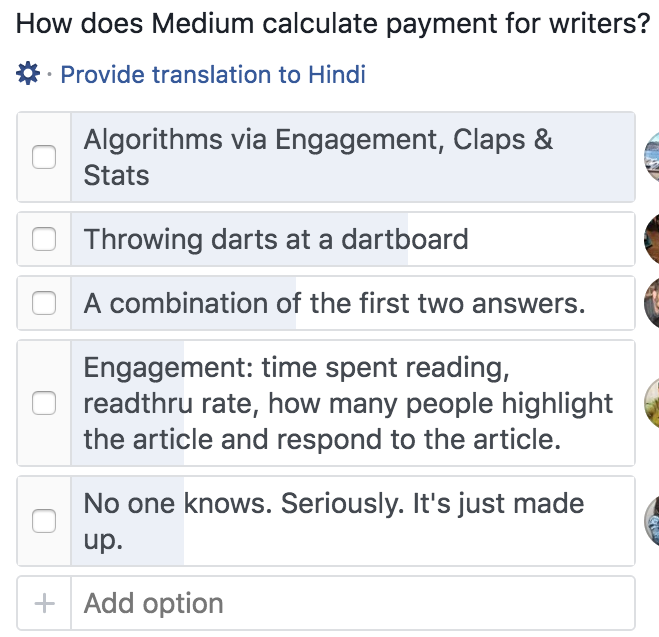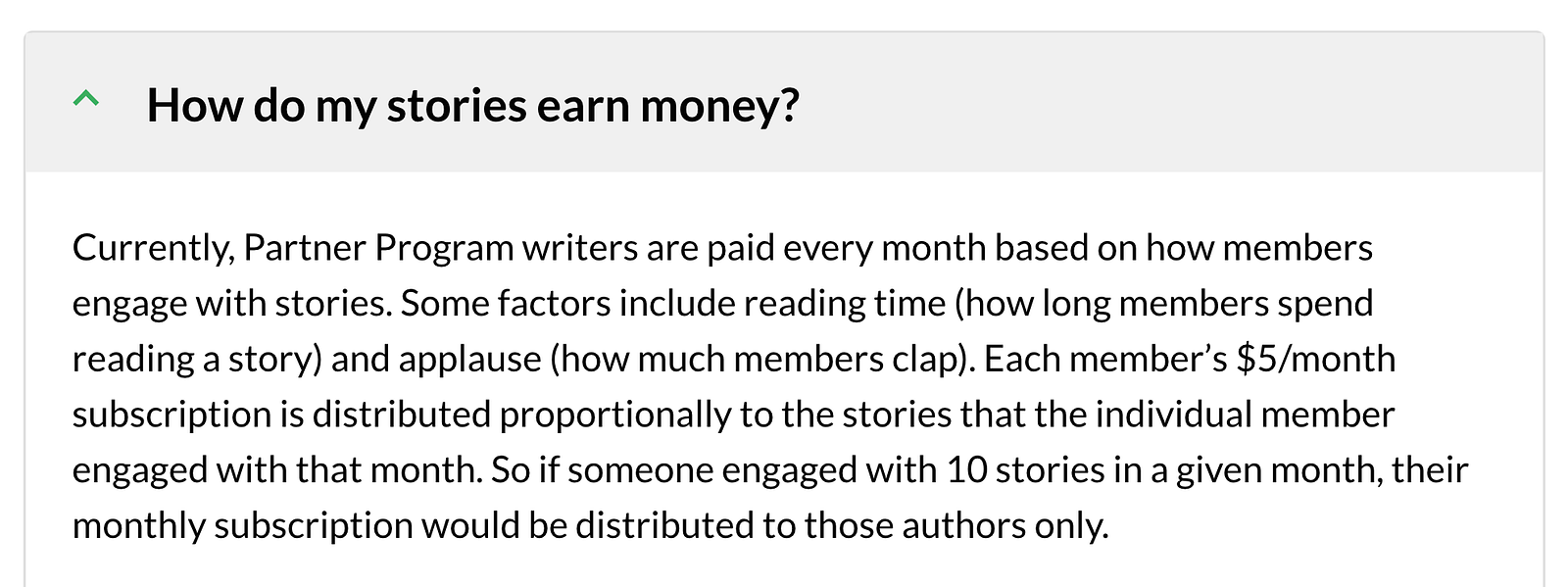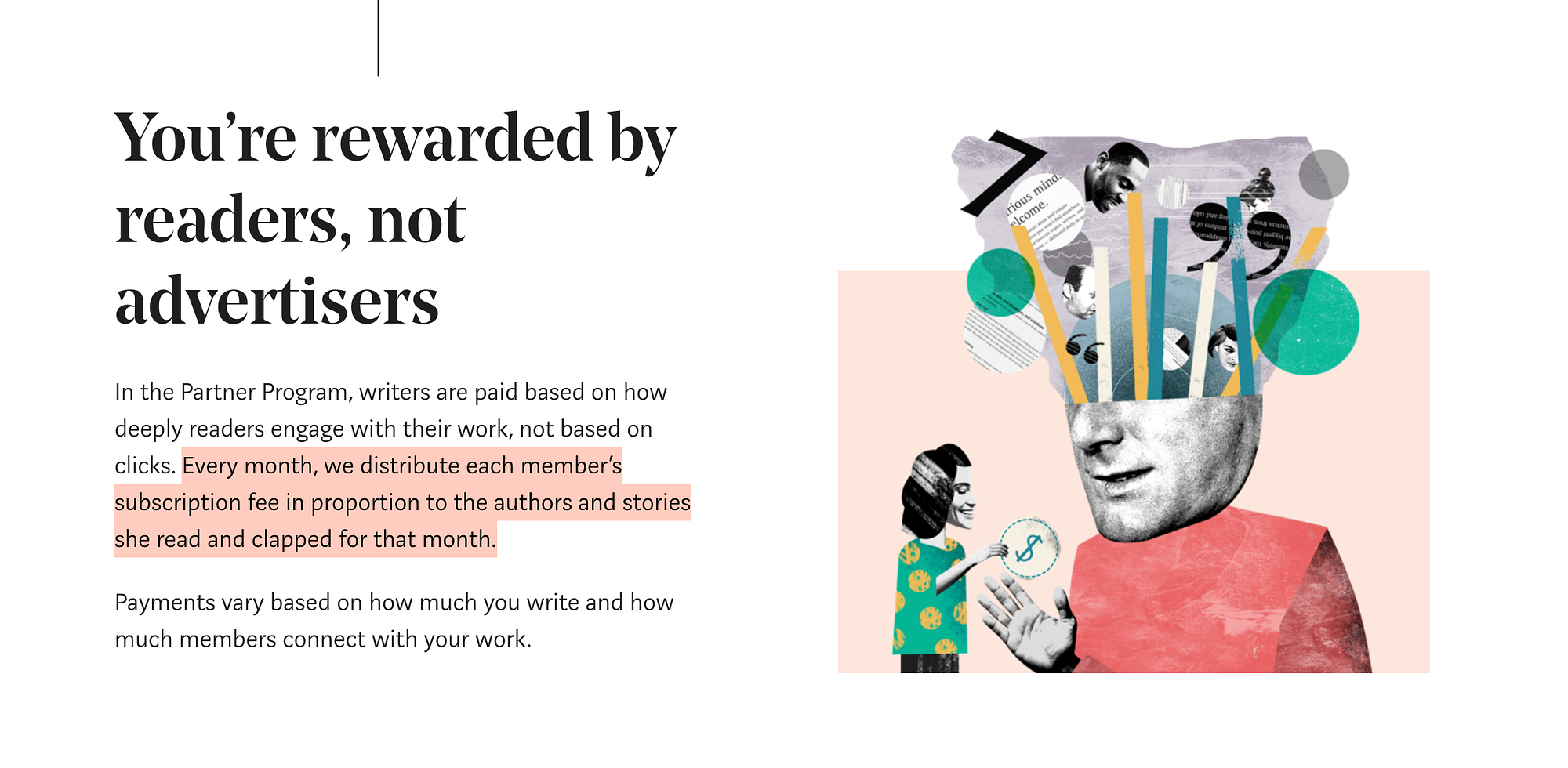How the medium earning algorithm works
Originally published on Medium

Debunking popular myths
 (From Grow Your Blog Movement)
(From Grow Your Blog Movement)
Given all the misinformation and guessing going on in medium discussion forums, like Medium Mastery and Grow Your Blog Movement, I figured it was time to put in some effort and make things clearer for everyone.
I come from a background in computer science, which gives me a unique perspective — the background to create something like the Medium Earning Algorithm. This is something normal writers lack.
Further, all my findings add up. I analysed earnings of 10 posts, 6 of them coming from my dashboard. With the algorithm below, you can figure out what matters — and hopefully not get discouraged by weeks of great engagement but disappointing earnings. ( Looking at you, Cheney )
Here’s how it works, or how I would create it.

First, our set of assumptions.
The earning algorithm is fair
If it weren’t fair, a Medium competitor would crop up — one which was fair — and thus attracting most writers. Medium is smart, so its algorithm is fair.
There is no money being minted out of thin air
Medium isn’t putting more money into its ecosystem to reward normal writers directly. Not anymore, not when its own costs are skyrocketing. While there is still no clear business model — I don’t think it takes money from subscriptions, not when it says it doesn’t. Medium is smart, so it avoids controversies.
Medium will try to ensure no one figures out the exact algorithm
This is the same as Google keeping its search algorithm private. You have SEO tactics because the algorithm is private. If it weren’t, you could game the system.
It’s the same with Medium. If we were able to figure out the exact algorithm, we could game it. This would make Medium unfair. This contradicts our first assumption. Medium is smart, so it hasn’t told us the real algorithm.
Medium is smart, so it hasn’t told us the real algorithm
Keeping this in mind, I’ll only explain the basic algorithm — which would account for, say 80% of your earnings. It has everything to do with clapping.
On a platform where we ought to focus on improving our writing — reverse engineering the algorithm to figure out the remaining 20% isn’t worth it. But that’s my opinion, your mileage may vary.
Let’s go.
What Medium says:
From the terms ( which we’d try not to get into)
 (https://help.medium.com/hc/en-us/articles/115011927148-Medium-Partner-Program-Terms)
(https://help.medium.com/hc/en-us/articles/115011927148-Medium-Partner-Program-Terms)
We could stop here, but this is all public information. We need to delve deeper to reach our conclusions.
I realise that things haven’t always been this way. There was a lot of pivoting and experimentation involved while Medium honed in on an algorithm. That is clear via scathing pieces like this:
Medium’s Mess: The rise and fall of the site that was supposed to save journalism
_Going to the homepage of Medium.com means entering one of the most conflicted spaces in digital media. It’s a black…_studyhall.xyz
We are in a stable place now. We’ve reached critical mass. There are enough great writers that Medium can stop incentivising.
There is enough stability to promote clarity.
There is enough data to guess the current stable algorithm.
The algorithm
Given our first assumption, we remove all randomness from the picture. If the algorithm is fair, it can’t be random.
That rules out throwing darts and no-one knowing. Sorry, Nupoor.
Given our third assumption, let’s consider only the primary metric: claps.
Writers approach earnings from their perspective.
I have 500 claps on one article which earned $1. My friend has 1 clap on another article which earned $1 as well. Whaat!? Blasphemy! Medium is shit! This is so random! Is Medium throwing darts!?
The thing is, everything revolves around the readers, not the writers.
Not every fan is created equal
Consider Alice and Bob. Alice loves clapping 50 times for every story she reads. Bob is much more stringent with his claps, and claps once for about 5 stories a month.
Over the entire month, Alice claps 2000 times and Bob 5 times.
Since both started with the $5 for the entire month (second assumption), each clap from Alice is worth 0.0025$ or 0.25¢
Each clap from Bob is worth 1$.
If your article attracted 10 people like Alice, you’d have 500 claps and earn 2.5$
If your article attracted 1 person like Bob, you’d have 1 clap and earn 1$ .
See the difference? That’s why the metrics seem so skewed from the writers perspective. One week you’re making $1 per fan, the next, $0.1 . Tracking $ per clap makes even less sense.
Note: This doesn’t mean readers should clap less. That’s the wrong way to interpret this.
Diving deeper
At this point, you could charge at me shouting that clapping isn’t the only thing that matters!
If that’s true, read on. If not, skip to the conclusion. This bit isn’t that important.
You’re right. Clapping isn’t the only thing that matters. However, measuring claps is fair and objective.
How would you distribute earnings between an article that got claps and another that got highlights? It’s like comparing apples and oranges.
Here’s how I would do it: weighted averaging.
You have claps which form the base score.
You decorate it with other metrics: reading ratio, highlights, responses.
Each of the other metrics gets a small weight. Multiply the base score by this small weight to get the final score.
These weights can’t be too high — if they are, people will realise it. If they do, they’d optimise for one thing over the other.
If the reading ratio matters more, people will start writing short 1 min articles which are read 100% — thus earning more.
If the responses matter more, people will start creating bots that respond to their stories — thus earning more.
If the highlights matter more, people will start creating bots that highlight their stories — thus earning more.
All these scenarios result in Medium becoming a shittier place. Since Medium is smart, ( it’s run by Ev Williams after all ) it won’t do this.
Now you get the final score for one article. Find the final score for all articles, and the money given to the author of this one article is the appropriate fraction of $5 . If this bit isn’t clear, ask in the comments, I’ll give you an example!
Myth busting
 (via Greg Fultz)
(via Greg Fultz)
You’re spot on about the algorithm idea. The implementation above makes the next bit clear — it might look illegitimate but that’s not the case. The “clap party” means you’re becoming Alice. Those claps earn less.
 (via Christina Hausauer)
(via Christina Hausauer)
There are two things here — external readers and external referrers.
External referrers lead back to Medium. These are counted as normal views, since everything is happening, in the end, on the Medium app. Facebook is an external referrer, since it leads back to Medium.
There’s no distinction between the Medium “app” and “website”.
External readers have the medium articles copied in their own feed. These are the weird “+124” reads that sometimes show up on your articles. Specially when writing with publications that have feeds to external readers.
 (via Stephen Moore)
(via Stephen Moore)
Yes, exactly, this is Alice vs Bob! However, as a reader you don’t have to think about this. Medium wants you to clap for what you like. If you like everything equally — sure give everyone 1 clap or 50 claps, it doesn’t matter.
As a reader, if you give 50 claps to things you don’t like, it makes it difficult for you to reward things you do like. Don’t do this. ( Thanks for bringing this up, Stephen! )
Conclusion
Claps rule your earnings.
More importantly, claps from the right people rule your earnings.
It’s the 80/20 principle at work again: Majority of your earnings will come from a minority of the people. It’s the Bobs that will make or break your bank.
The burning question then is how do you attracts Bobs?
The simple answer is you keep writing. You get better. You get curated. You get featured.
You focus not on the metrics, but what the metrics represent — amazing writing.
Since Medium is smart, over time the metrics would converge to what the metrics represent — amazing writing.
When that happens, if it hasn’t already, nothing will be able to stop you from earning enough.

You might also like
- Agentic Debt
- What I learned about burnout and anxiety at 30
- How to setup duration based profiling in Sentry
- How to simulate a broken database connection for testing in Django

 (
(